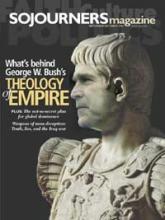Come to the Table
Invite your friends, pass the cookies, and dig into Sojourners. Table Talk discussion guides provide a gathering place for communities to discuss issues of faith, politics, and culturelocal and global. Table Talk offers a smorgasbord of questions (enough for four sessions, if you want to arrange it that way), as well as resources for further study and action. You bring dessert.
Download in Word or PDF format (requires Acrobat Reader) for copy-ready versions with fewer pages, or click "print this article" button on right.
----------------------------------------------------------
Session I. God and Empire
"Dangerous Religion" (p. 20)
"The Project for a New American Empire" (p. 27)
"Defiant Daughters" (p. 31)
Jim Wallis critiques George W. Bush's transformation from a self-help Methodist to a man who seems to view his presidency, and America's position of power, as part of a divine plan to "rid the world of evil." As Duane Shank reveals, the administration's wars and policy are shaped in large part by right-wing ideologues bent on maintaining the U.S.'s worldwide military superiority. Laurel Dykstra's study on Exodus offers one biblical response to empirethe resistance of Pharaoh's daughter.
Questions to Consider
Read the Full Article
